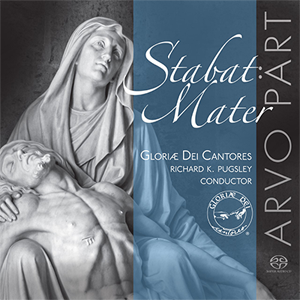For the past several decades Arvo Pärt’s music (and especially his choral works) has enjoyed a deep-rooted, enduring popularity around the world as substantial and sincere as any composer could hope for, and as such most of it has been very well served on multiple recordings, including most of the pieces on this program. Some of the works exist in different performing configurations, and you could spend hours (as I have) immersed in the catalog, comparing and contrasting the various versions on this or that recording. Or, you could just select a particular recording by first-rate performers, as we have here, irrespective of the provenance of each work, and just enjoy it on its own terms. Pärt is Pärt–the different versions are not “improvements”, just alternate options for different performing groups and situations.
Salve Regina, Stabat Mater, and L’abbé Agathon fall into this multiple-version category, and while the first two have received very fine previous recordings in the current configurations (mixed choir and organ; choir and string orchestra), the latter is a slightly different case. L’abbé Agathon for soprano and eight cellos was first performed in 2004 in Beauvais, France, by L’Octuor de violoncelles de Beauvais (who commissioned it) and soprano Barbara Hendricks. However, there are also versions for soprano, four violas, and four cellos (2005) and for soprano, alto or baritone, female choir, and string orchestra (2008), which is the one we hear on this program. There is apparently only one other recording of this version, on ECM, which is available as a download (not a first choice for many listeners) and, for some reason, annoyingly inconvenient (and expensive) to obtain as a CD. Which makes this recording even more desirable, not only for its accessibility but for its excellent performance of this rarely heard work.
And speaking of these performers, Gloriae Dei Cantores and its director Richard Pugsley are not just another fine choir interested in presenting a program of Pärt’s music. They went into this project with an extraordinary commitment to not only know the notes, but also to know the composer. As described on the choir’s website (but for some reason not in the disc’s liner notes): “Dedicated to promoting the best of sacred choral music, several years ago Gloriæ Dei Cantores began an in depth study of Arvo Pärt. Immersing themselves in [his] compositional style, they sang his music in worship, on tour, and during an extensive concert series at the Church of the Transfiguration in Orleans, Massachusetts.
“Each member of Gloriæ Dei Cantores has presented in-depth study projects on Arvo Pärt’s composition style and his musical approach to the vision and the text. Striving to present the true intention of the composer and to bring to life the music and vision as the composer himself would have liked to hear it portrayed, conductor Richard K. Pugsley coaches the choir to step aside and allow the music itself to bring forth a vision, and to communicate the soul and spirit of the sound.”
And, not surprisingly, all of that translates into a recording of deeply felt performances that are always mindful of allowing the unadorned simplicity, the stark beauty and unpretentiousness of Pärt’s music to flower. You can read in almost every commentary of Pärt’s work about the details of his style and technique (if you’re interested you can find some of this in our previous reviews), and you can do what you will with the many mostly futile attempts to explain how this unique composer does what he does in order for his music to claim this uniqueness (we’ve tried this too). But the proof is in the singing, and here you have it–in an exemplary “American” sound that contrasts distinctly with the Estonian, German, and British choirs who’ve also championed Pärt’s music. If you’re a choral music fan, you already have Pärt in your life; if you’re new to his music, you can happily start here–or with any of the reference recordings.
































